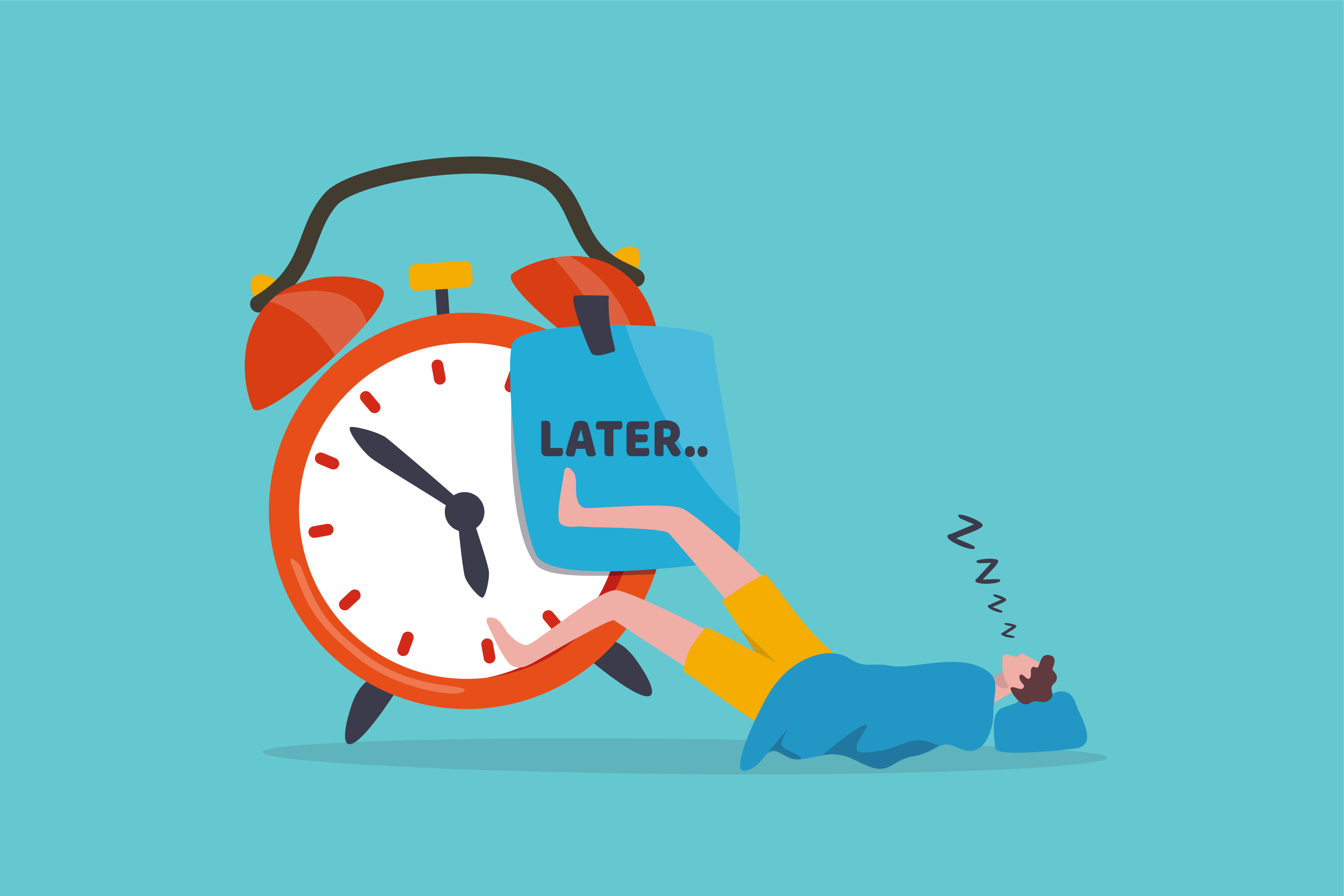To overcome procrastination, address underlying issues like anxiety, low self-esteem, and poor study habits. Procrastination can lead to negative mental health effects and physical illness, so it’s crucial to tackle it head-on.
Procrastination is a common issue that affects many people, often leading to stress and anxiety. It can be linked to various factors such as depression, anxiety, low self-esteem, ADHD, and poor study habits. Furthermore, procrastination is not just about avoiding work; it’s about avoiding the negative feelings that starting a task may evoke, such as feelings of incompetence and insecurity.
In this blog, we will explore effective strategies to combat procrastination and improve productivity, ultimately leading to a healthier and more balanced lifestyle.

Credit: www.apu.apus.edu
Table of Contents
ToggleIntroduction To Procrastination
Procrastination can be linked to various factors such as depression, anxiety, and poor study habits. People who procrastinate tend to have high levels of anxiety and poor impulse control, which can lead to negative functioning and risks to mental health.
To overcome procrastination, try breaking down tasks into smaller, more manageable ones and organize your study space to create a more productive environment.
The Psychology Behind Delaying Tasks
Procrastination is a common phenomenon that affects people of all ages and backgrounds. The psychology behind procrastination is complex, and there are several factors that contribute to it. One of the main reasons people procrastinate is because they lack motivation or have difficulty concentrating. Procrastination can also be a result of anxiety, depression, or low self-esteem. Studies have found that people who procrastinate tend to have poor impulse control and are more likely to engage in risky behaviors. They may also experience higher levels of stress, which can lead to physical health problems such as headaches, digestive issues, and even heart disease.Procrastination’s Impact On Health
Procrastination can have a significant impact on a person’s health. When people procrastinate, they often experience high levels of stress, which can cause physical and mental health problems. Chronic stress has been linked to a range of health issues, including high blood pressure, heart disease, and stroke. Procrastination can also lead to poor sleep, which can further exacerbate stress and anxiety. When people put off important tasks, they may feel guilty or ashamed, which can affect their mood and self-esteem. This negative emotional state can lead to a cycle of procrastination, where people continue to put off tasks and feel increasingly overwhelmed. In conclusion, procrastination is a common problem that can have serious consequences for a person’s health and well-being. By understanding the psychology behind procrastination and taking steps to manage it, people can improve their productivity and reduce their stress levels.Identifying Your Procrastination Triggers
Understanding the triggers that lead to procrastination is crucial for effectively managing this behavior. By identifying the specific factors that contribute to procrastination, individuals can take proactive steps to address and overcome these challenges. This self-awareness can empower individuals to make positive changes and improve their productivity.
Self-reflection On Procrastination Habits
Self-reflection is an essential step in identifying your personal procrastination triggers. Take the time to analyze your habits and patterns when it comes to delaying tasks. Consider the situations or types of tasks that consistently lead to procrastination. This introspective approach can provide valuable insights into the underlying causes of your procrastination tendencies.
External Vs. Internal Triggers
Procrastination triggers can be categorized as either external or internal. External triggers may include environmental factors, such as a noisy workspace or constant interruptions. On the other hand, internal triggers are rooted in personal emotions and thought patterns, such as fear of failure or perfectionism. Distinguishing between these two types of triggers can help individuals develop targeted strategies to address each category effectively.
Strategy 1: Time Management Techniques
Effective time management is crucial for overcoming procrastination. By prioritizing tasks effectively and using techniques like the Pomodoro Technique, you can boost productivity and minimize procrastination.
Prioritizing Tasks Effectively
One of the key strategies for managing your time efficiently is to prioritize your tasks. By prioritizing tasks effectively, you can ensure that you focus on the most important and urgent activities first. This can help you avoid the trap of procrastination and ensure that you make progress on your most critical tasks.
The Pomodoro Technique
The Pomodoro Technique is a popular time management method that involves breaking your work into intervals, traditionally 25 minutes in length, separated by short breaks. This technique can help you maintain focus and productivity by working in short, concentrated bursts. By utilizing the Pomodoro Technique, you can combat procrastination and enhance your efficiency.
Strategy 2: Creating The Right Environment
When it comes to overcoming procrastination, one effective strategy is to create the right environment that promotes focus and productivity. By designing a distraction-free workspace and considering the role of ergonomics in productivity, you can set yourself up for success and minimize the temptation to procrastinate.
Designing A Distraction-free Workspace
In order to avoid distractions and stay focused on your tasks, it’s important to design a workspace that is free from potential interruptions. Here are some tips to create a distraction-free environment:
- Choose a quiet area away from noisy distractions such as television or loud conversations.
- Keep your workspace clean and organized to minimize visual clutter.
- Remove or minimize distractions such as social media notifications or unnecessary gadgets.
- Use noise-cancelling headphones or background music to help maintain concentration.
The Role Of Ergonomics In Productivity
Ergonomics plays a crucial role in productivity and overall well-being. By ensuring that your workspace is ergonomically optimized, you can enhance your comfort and reduce physical strain, allowing you to focus on your work without discomfort or distractions. Consider the following ergonomic practices:
| Key Ergonomic Practices | Benefits |
|---|---|
| Adjust your chair and desk height to maintain proper posture. | Prevents back and neck pain. |
| Position your computer screen at eye level to avoid strain on your neck. | Reduces eye fatigue and discomfort. |
| Use an ergonomic keyboard and mouse to minimize strain on your wrists. | Prevents repetitive strain injuries. |
| Take regular breaks to stretch and move around. | Improves blood circulation and reduces muscle fatigue. |
By creating a distraction-free workspace and considering ergonomic principles, you can optimize your environment for productivity and minimize the likelihood of succumbing to procrastination. Remember, a well-designed workspace can have a significant impact on your focus, efficiency, and overall success.
Strategy 3: Incremental Progress
Strategy 3: Incremental Progress is a powerful tool to combat procrastination. By breaking tasks into smaller, manageable steps, you can make progress and overcome the tendency to delay. This approach helps to alleviate overwhelm and boosts motivation, leading to increased productivity.
Breaking Down Tasks Into Smaller Steps
One effective way to overcome procrastination is to break down tasks into smaller steps. When we face a big project or task, it can seem overwhelming and daunting, leading us to put it off. However, by breaking it down into smaller, more manageable steps, we can make progress without feeling overwhelmed. For example, if you need to write a report, start by breaking it down into smaller tasks like researching, outlining, and drafting. By focusing on one step at a time, you can make progress and build momentum towards completing the larger task.Celebrating Small Victories
Another key aspect of the incremental progress strategy is celebrating small victories. When we make progress towards our goals, it’s important to acknowledge and celebrate these accomplishments. This can help to boost our motivation and confidence, making it easier to continue making progress. For example, if you complete one of the smaller steps in a project, take a moment to acknowledge and celebrate your accomplishment. This could be as simple as taking a short break, treating yourself to a snack, or sharing your progress with a friend or colleague. By breaking down tasks into smaller steps and celebrating small victories, we can make incremental progress towards our goals and overcome procrastination. Remember, even small steps can lead to big accomplishments!
Credit: tinybuddha.com
Strategy 4: Accountability Partners
Strategy 4: Accountability Partners is a powerful tool to combat procrastination. By partnering with someone who holds you accountable for your actions, you are more likely to stay focused and motivated to achieve your goals. This strategy helps you overcome the urge to delay tasks and ensures that you stay on track towards success.
The Benefits Of A Study Buddy Or Workmate
One of the most effective ways to overcome procrastination is to have an accountability partner. An accountability partner is someone who helps you stay on track and holds you accountable for completing tasks. This can be a friend, family member, colleague, or even a professional coach. Having an accountability partner has many benefits, especially when it comes to studying or working. Here are some of the benefits of having a study buddy or workmate:- Provides motivation and encouragement to stay on track
- Increases productivity and efficiency
- Helps to overcome obstacles and challenges
- Provides feedback and constructive criticism
- Reduces feelings of isolation and loneliness
Using Social Commitment As Motivation
Social commitment is a powerful motivator that can help you overcome procrastination. When you make a commitment to someone else, you are more likely to follow through on your promises. This is because you don’t want to let the other person down or disappoint them. When you have an accountability partner, you are making a social commitment to them. This can be a great motivator to help you stay on track and complete tasks on time. You can use this social commitment to your advantage by setting specific goals and deadlines with your accountability partner. For example, if you have a study buddy, you can commit to studying for a certain amount of time each day or week. You can also set goals for completing assignments or preparing for exams. Your accountability partner can help you stay on track and provide encouragement and support along the way. In conclusion, having an accountability partner is a powerful strategy for overcoming procrastination. It provides motivation, encouragement, and support, and can help you stay on track and complete tasks on time. Whether you’re studying for an exam or working on a project, consider finding an accountability partner to help you achieve your goals.Strategy 5: Understanding And Tackling Emotions
Understand and tackle emotions to overcome procrastination. Addressing negative feelings associated with starting a task, such as incompetence and insecurity, is key to managing procrastination effectively. By acknowledging and managing these emotions, one can increase productivity and achieve better mental well-being.
Managing Anxiety And Fear Of Failure
Procrastination is often fueled by anxiety and fear of failure. When faced with a daunting task, it’s natural to feel overwhelmed and anxious about the outcome. However, by understanding and managing these emotions, you can overcome procrastination and increase your productivity.
An effective way to manage anxiety is to break down the task into smaller, more manageable steps. By focusing on one step at a time, you can reduce feelings of overwhelm and gain a sense of accomplishment as you complete each step. Additionally, practicing deep breathing exercises or mindfulness techniques can help calm your mind and alleviate anxiety.
Fear of failure is another common emotion that leads to procrastination. Many individuals avoid starting a task because they are afraid of not meeting their own or others’ expectations. Building self-compassion and reframing failure as a learning opportunity can help overcome this fear. Remember that everyone makes mistakes and that failure is a natural part of the learning process.
Building Self-confidence To Combat Procrastination
Low self-confidence can contribute to procrastination as individuals may doubt their abilities to successfully complete a task. Building self-confidence is crucial in combatting procrastination and achieving your goals.
One way to boost self-confidence is by setting realistic and achievable goals. Break down larger tasks into smaller, more manageable goals, and celebrate your achievements along the way. Recognizing your strengths and past successes can also help build confidence in your abilities.
Additionally, surrounding yourself with a supportive network of friends, family, or mentors can provide encouragement and reassurance. Seek out positive affirmations and practice positive self-talk to reinforce your belief in your capabilities.
Remember, building self-confidence is a gradual process, and it requires consistent effort and self-reflection. Embrace challenges as opportunities for growth and believe in yourself.
Maintaining Momentum And Preventing Relapse
When it comes to overcoming procrastination, maintaining momentum and preventing relapse are crucial aspects of the journey. Staying on track with consistent routines, handling setbacks without reverting to old habits, and finding the right strategies to keep moving forward are essential for long-term success.
Staying On Track With Consistent Routines
Consistent routines are the cornerstone of defeating procrastination. By establishing a daily schedule and sticking to it, individuals can create a sense of structure and stability in their lives, making it easier to stay focused and on track. This can involve setting specific times for work, breaks, and leisure activities, as well as prioritizing tasks based on their importance and deadlines.
Handling Setbacks Without Reverting To Old Habits
Setbacks are inevitable on the journey to overcoming procrastination. It’s essential to approach setbacks with resilience and a positive mindset. Instead of reverting to old habits, individuals can view setbacks as learning opportunities, identify the factors that led to the setback, and make necessary adjustments to their approach. This can include seeking support from friends, family, or a mentor, and practicing self-compassion to avoid self-criticism.
Conclusion: Embracing A Proactive Lifestyle
After exploring the detrimental effects of procrastination and the strategies to overcome it, it’s clear that embracing a proactive lifestyle is essential for personal growth and success. By understanding the long-term benefits of overcoming procrastination and finding encouragement for continued personal growth, individuals can cultivate a proactive mindset that leads to increased productivity and fulfillment.
Long-term Benefits Of Overcoming Procrastination
Overcoming procrastination yields numerous long-term benefits, including improved mental well-being, enhanced productivity, and increased self-confidence. By tackling tasks promptly, individuals can reduce stress and anxiety, leading to a more positive outlook on life. Additionally, completing tasks on time fosters a sense of accomplishment and self-efficacy, reinforcing the belief in one’s abilities to achieve success.
Encouragement For Continued Personal Growth
- Set achievable goals and prioritize tasks effectively to maintain momentum and drive.
- Seek support from mentors, coaches, or peers to stay motivated and accountable.
- Practice self-compassion and celebrate small victories to sustain enthusiasm for personal development.
- Embrace challenges as opportunities for growth, fostering resilience and adaptability.

Credit: procrastination.com
Frequently Asked Questions
Why Do Procrastinators Procrastinate?
Procrastinators procrastinate due to various factors like anxiety, low self-esteem, and poor impulse control. It can be linked to mental health risks and physical illness. ADHD traits can also contribute to procrastination behavior. Procrastination is an emotion regulation issue, not just a time management problem.
How To Procrastinate Procrastination?
To procrastinate procrastination, try these tips: 1. Break tasks into smaller, manageable parts. 2. Create a schedule or to-do list to stay organized. 3. Find accountability by joining a group or getting a study buddy. 4. Eliminate distractions and create a productive study environment.
5. Practice self-discipline and prioritize tasks based on importance. By following these guidelines, you can overcome procrastination and improve productivity.
What Does Procrastinate Mean?
Procrastinate means to intentionally delay or postpone something that needs to be done. It is often linked to factors like depression, anxiety, low self-esteem, ADHD, and poor study habits. Procrastination can have negative effects on mental health and overall functioning.
It is also associated with high levels of anxiety and poor impulse control. To overcome procrastination, you can try breaking down tasks into smaller, more manageable ones and creating an organized study space.
Is Procrastination A Form Of Adhd?
While procrastination is not an officially recognized behavior of ADHD, individuals with ADHD may be more prone to procrastination due to associated traits such as short attention span and lack of interest in the task at hand. Procrastination can lead to negative mental health and physical consequences.
It can be linked to depression, anxiety, low self-esteem, and poor study habits. Effective strategies for managing procrastination include breaking tasks down into smaller ones and organizing study space.
Conclusion
Procrastination is a common behavior that can be linked to various underlying factors such as depression, anxiety, low self-esteem, ADHD, and poor study habits. It is not just about avoiding work, but also about avoiding the negative emotions that come with starting a task.
Procrastination can have negative effects on mental health and overall functioning. By understanding the reasons behind procrastination and implementing strategies to overcome it, individuals can improve their productivity and well-being.

